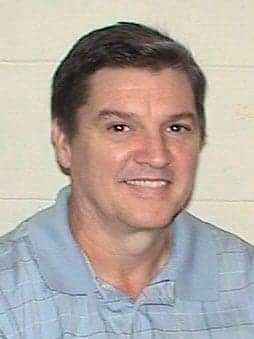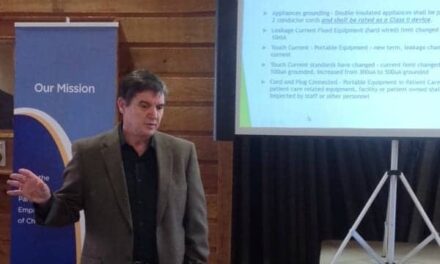
Before the Exam
The first thing I would suggest is to commit to a study plan. Decide how much time you can devote to your study process, and try to stick to it. Remember, the longer you give yourself for the study process, the better you will retain the information studied. I would suggest you begin as far ahead of the exam date as possible, with 1 to 2 hours per week of study time.
Begin by covering basic topics such as physics, chemistry, and math, along with medical terminology, since knowing these subjects well may help you provide the correct answer to exam questions. Covering subjects such as physics should refresh your memory about many topics that could appear on your test, such as the gas pressure laws or the difference between a tank pressure and a gauge pressure, to name just a few. Review of chemistry topics such as the pH scale or what constitutes an isotonic solution may pay dividends on the exam as well. Your preparation in these topics will play a pivotal role in your determining the best answer to an exam question.
I would also study basic math, such as working with fractions, conversions of numbers from milli to micro, and so forth. If you had a question that involved exponents, would you know how to handle it? What about a radical sign in math?
Medical terminology is another area that should definitely be reviewed, as questions will include terminology in them that can help indicate the correct answer. An example may be the use of a suffix such as -ectomy as opposed to –otomy. Knowing the difference may tell you which answer is correct.
Once you have reviewed background topics such as physics and chemistry, you may want to start studying specific information found in one exam section, such as electricity and electronics, and then proceed to study each of the other areas of the exam.
Again, I cannot stress enough the need to begin your study process as early as possible. Many educational studies prove that cramming information in a short period of time does little to help prepare for an examination, and may actually be detrimental to retaining information as the cramming process may only create stress and not knowledge.
Study Tips
When studying, pick a place that is quiet, well lit, and free of distractions. Turn off your cell phone, turn off the television, and don’t try to take care of the kids. If you must, delay your study time until the kids are in bed, or study at work before you go home. You should dedicate small chunks of time to review material: Usually, 45 minutes to 1 hour is a good time frame. With smaller chunks of time such as this, you will be less fatigued and the information will be recalled more easily.
A study technique that is all too often overlooked is to review material and then summarize in writing what you have studied. Once you read what you have written, you can see whether you explained the information correctly. Writing is a proven exercise that helps information transfer into long-term memory.
Another great learning technique is to find a study partner so that you can help each other. You may want to explain the information or “teach” it to your study partner. This technique solidifies the information and makes it easier to recall later on. An example would be to explain how blood flows through the heart and body. Your study partner may have notes to make sure you include all relevant information, such as valves in the heart, chambers of the heart, veins, arteries, arterioles, and other structures in the circulatory system. Making flash cards is another great way to review the information studied.
As you get closer to your examination date, pick up the pace of study from 1 or 2 hours a week to as much time as you can comfortably devote, given all the outside pressures on your time. Again, try to stick to your plan of studying in the same place and at the same time, but now just add more time.
Take care of yourself for the last couple of days before you sit for your exam. Eat well and stay hydrated, because good nutrition and hydration will allow you to perform at your best. One of the very most important techniques to doing well is to get a good night’s rest before the exam. This would mean no staying up late and cramming. If you have started your study process early enough, there should be no need for an all-nighter!
Exam Day
On the morning of the exam, eat a good breakfast with lots of protein, as this will fuel your body effectively for test taking. You should plan to be at the testing site well before the exam starts, as the extra time will alleviate any stress associated with traffic and directions. Know exactly where the test room is located and what items you may and may not bring in with you. This preplanning is designed to reduce unnecessary stress before the exam. Just sitting for the exam is stressful enough.
Once you sit down with the exam, many educators suggest you do a mind dump. This consists of writing on a scratch sheet of paper things that may be on the test and you have a hard time memorizing. An example might be, if you have a hard time remembering the colors of the ECG leads, write that information down so you can refer to it later. This is another stress-relieving technique.
As you progress through the test, you will probably feel muscles tighten and stress creeping in. Stop and take a few deep breaths. If this does not seem to help, remember that you can be excused to go to the restroom, and if that relieves stress, so be it.
You should also make sure what the question is asking. You may want to read the question twice and attempt to answer it before you see the choices for answers. This way, if you see the answer you felt would be correct, you can feel relatively certain about it.
Read the first question on the test and answer it unless you really don’t know the answer. In general, any time you don’t know an answer, skip the question and go on to the next one. The reason for this strategy is that other questions may jog your memory for the preceding questions you are not sure of.
When you go back to the questions you skipped and still don’t have a better idea of the answer, try to eliminate one or two of the answers. If you can safely eliminate one choice, your chance of getting the right answer will increase from 25% to 33%. If you can eliminate two choices, your chances increase to 50%. Make sure before you submit your exam that each question you skipped has been answered, as unanswered questions are always marked as incorrect. If you still don’t know the answer, but you have a hunch, use it. The brain is an amazing organ: We fill it full of facts, and it tries to give back the correct answer, even if we don’t realize it.
Last but not least, DO NOT go changing your answers! Unless you are so sure you would bet a paycheck on changing it, you should avoid the temptation. It’s a proven fact that such answers are most often changed to an incorrect one.
After the Test
RELAX! There is nothing more to do but wait for the results. Congratulate yourself on the hard work you have put into the exam, and know you are most likely a better technician by having gone through the study process. In a few short weeks, you will most likely be rewarded by your efforts.
I hope you will employ these techniques along your journey to become certified, and that you find these suggestions helpful.
Until next time, study well!
John Noblitt, MAEd, CBET, is the BMET program director at Caldwell Community College and Technical Institute, Hudson, NC. For more information, contact editorial director John Bethune at [email protected].





